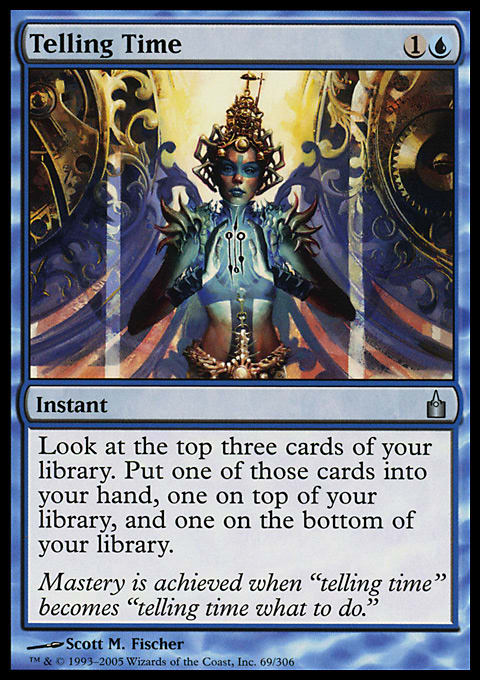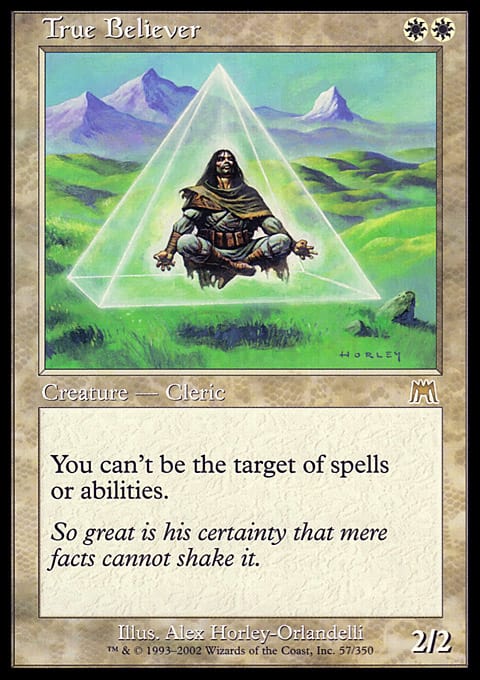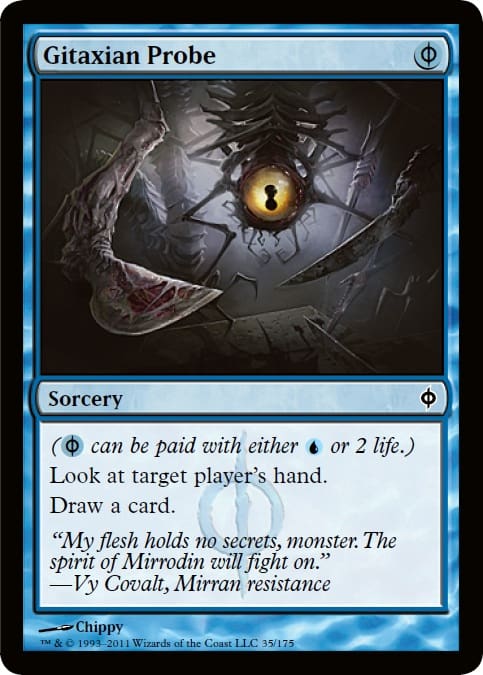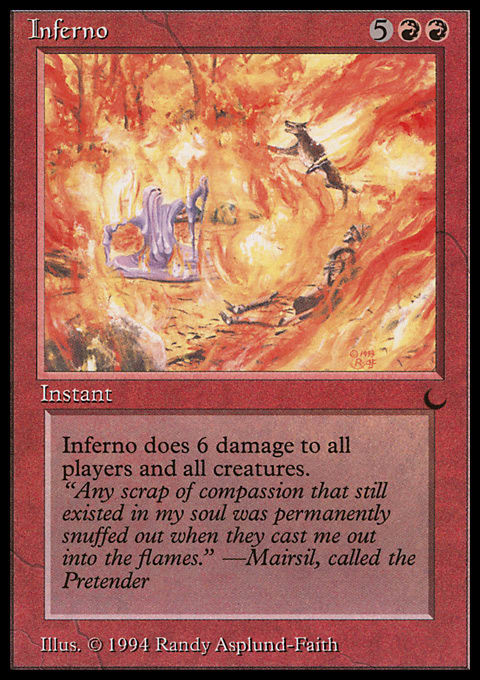Prologue
A few weeks ago, my friend James asked the following:
This is a great question because it not only points out a specific perceived problem - one I agree with and that heavily informs my Magic theory frameworks - but it also allows us to think about, and at least begin to, solve other problems that lie on the implied periphery of taking in Magic content from a bunch of people and a bunch of places.
First, a story.
A Story
Years ago at a tournament, World Champion Brian Braun-Duin had a player come up to him and ask for feedback on a decklist. Brian provided immediate, informed feedback. The player respectfully (and hilariously, given the context) rejected Brian's feedback and then reinforced his own card choices essentially by talking to himself. In hindsight, I imagine it would've been more funny (and more straightforward) for the player to walk up to Brian, say hello, then declare that he was going to talk to himself about his Magic deck for a minute. Because that's what actually happened.
The Story is Over. Let's Talk Magic Content
Ultimately, it comes down to two very intertwined things on each side of a content exchange: goals and values. It matters what these are for the reader or viewer (or "content consumer" or "influencee" or whatever the hell dopey marketers most recently conjured as their new useless word for "folks doing a thing"), and it matters what these are for the writer or creator.
I'm going to first address the writer/creator half of the relationship, but first, let's talk about credibility and its relationship to the nature of authority:
Who Controls the Past Controls the Future
The Meritocracy Intuition is most definitely an unproductively common thing, but solving it entirely is also impossible.
Put another way: There's only so much time in the day. Beyond data-mined big money sports, it's pretty much impossible to put together enough objective time and resources to gauge accurate greatness in anything. Most people's expertise is reduced to only one or a few fields in their lifetime (probably because of our societal career structure, but I digress), so we have no choice but to defer to authority.
We do this all the time. We don't just "ask around" or go with the Google majority when we have a horrible toothache, and we sure as hell don't try to operate on ourselves. We go to someone who knows what the hell they're doing.
And no, I would not have thought this needed to be said, but it's 2019, so I've learned a lot about the mistake of taking credibility guidelines as self-evident public knowledge:
Not everything you read is credible or true, even in the most forgiving sense. Having a platform does not worthwhile content make. In other news, that anti-virus program you downloaded to get rid of your computer virus is itself a virus. Heads up.
That said, my credentials for going meta on Magic writing and Magic content today are the following: I was a Magic editor for two years and a Magic copy editor for three (as of this publishing). I consumed absurd amounts of Magic content. So as far as sample size, you won't do much better.
There's still just one issue with this whole credibility phenomenon...
Accurate. Because I am a human person, and biases exist in humans universally. And yet many of us still need to point this out and feel like it's a useful thing to do on its own in the refutation of just about anything. Remarkable.
Nevertheless, in the spirit of furthering my credibility on these Magic content matters, I'll come forth with the only relevant bias that I feel would color a reader's interpretations in a sizable way if they found out about it after the fact:
The Magic frameworks I've formalized right here on CoolStuffInc.com this year are not new to me and my brain; they in a large part composed from good data over a long period of time in the industry. This same data informs the work I do at present for the companies I work with outside of doing writing and content (though it does include that where applicable). Thus, I think it's in my best interests to not publicly toss around information that flattens the competitive advantage employers get from working with me. It's just the right thing to do.
There you go. I'm a cards on the table kind of guy.
My ironically selfless declaration of selfishness aside, let's think about writers/content creators for a second.
Understanding Writer/Creator Goals and Values
A quick brainstorm of reasons to write Magic articles or do Magic videos with the goal of making them publicly available:
- Contribute to Magic's growth.
- Make money.
- Connect with others with same interest(s).
- Attention.
- Grow as a player or professional.
So, spoiler alert: People need money to live. I'll not convince either of us otherwise. This isn't a manifesto.
However!
If I'm reading an article or watching a video, every impression I get that the author or creator is attempting the endeavor for odd-numbered reasons (see above list) is a positive one; every impression I get that the author or creator is attempting the endeavor for even-numbered reasons (see the list again if you need to, you can look at much as you want) is a negative one.
The reasoning seems pretty self-evident: money and attention motivations come from selfish characteristics, and selfish people suck! They're so much more worthless than people who do things for the greater good. Like seriously, how do you trust a selfish person to give a damn about how you, someone they've probably never even met, and your tournament results?
This isn't a binary thing. People can and do want money more at different times in their lives and work, they can want to grow as a professional or to help others in Magic more at different times - it's all contextual and fluctuating.
This isn't a grand declaration; it's simply the base level of how I evaluate the connection I can have with the creator and their material. Let's look at that further because that's how I'll best answer the initial question about sacred cows.
Understanding Reader/Viewer Goals and Values
Hey! I'm a reader and viewer of Magic content!
These are some of my personal red flags that the Magic content I'm looking at may be at risk of sucking:
1.) It has tons of references to products or offerings whether they're relevant or not.
I'm sure the tournament program is a great offering and that you have the best deals on all the new singles for the newest set release, but I swear I thought I clicked an article about skincare.
Seriously though, consumers will find good things that they want or need. Anything else is some level of pyramid scheme.
2.) It's hyperformulaic.
If it reads the same, it is. If it looks the same, it is. You deserve to be inspired. Move on.
3.) It's reactionary.
This is an article where the writer bypasses any and all critical thinking or effort and merely just takes the decklist that won the biggest event of the previous weekend and...reacts to it. With words.
Decklists are such an overabundance now. Like, who the hell needs this?
The only thing worse than this is when it's contrived community drama reactionary stuff, like "arguments" over cards being banned or people being banned or people being banned from bands. This is fooling positively no one.
4.) It's sanitized.
Seriously, the world is falling apart. Stand for something.
What in the World Does This Have to Do with the Original Question?
A lot, but I see your point.
Getting back to James' initial question: Are players wedded too closely to "sacred cows" of games?
Yes. It's bubble creep, and it goes well beyond Magic, video games, and the rest and into bigger life and bigger world things. It's a terrible human habit. Humans are great at generalizing, despite how not great generalizing is for us at this point. And yeah, the bigger the game, the bigger the audience, the more of this there is. The larger the crowd, the smaller the percentage of unique ideas, the thicker the insularity.
Fortunately for all of us, there seems to be a sort of survival mechanism among information worth preserving. Information and ideas themselves that are best equipped to survive into a greater awareness are definitely there; we just have to treat them as exactly that and not as "sacred" at all. Of course, all of this good surviving information can only do just that if the level of insularity hasn't closed off the possibility of ongoing new ideas and inputs.
In other words, not all these cows are sacred at all. Find and define your own sacred cows, and keep your mind open enough to nurture them. Trust your own judgment and trust that error correction will slowly even out the rest - assuming people are wise enough recognize it, which you, dear James, clearly are.
If my goal were to make sure I was "play-testing" optimally with my Magic content consumption, ideally, I'd divide it up like so:
- 50% writers that I believe reflect my goals and values.
- 20% writers that I do not believe have historically reflected my goals and values. (Nice try, bubble creep.)
- 30% writers and/or sites that I have not spent time with previously.
If I was in search of content that I feel would be less competitive or comprehensive, I would substitute in more joy-laden materials in place of the 20% of writers that I generally don't endorse or enjoy and climb up toward the next tier until I had sufficiently smiled freely.
I hope you're smiling freely today. Or at least thinking.
See you so soon,
(~_^)
"The Rascal"
The Indestructible Danny West
































